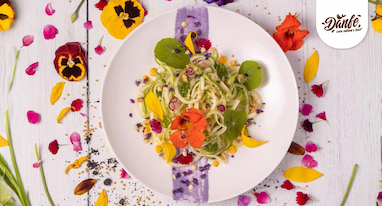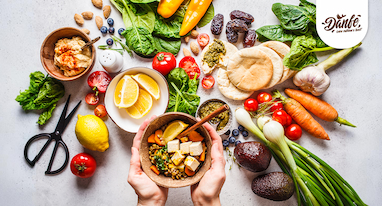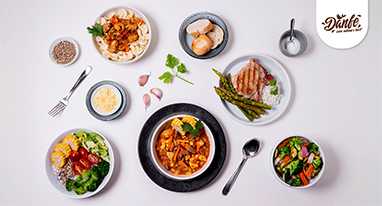Bara Masala: An Explosion of Flavor
BY DANFE |
Indian cuisine is one that is heavily integrated with all kinds of spices. There are many spice mixes (masalas) that are popularly used in India, some of the more well-known ones being garam masala, tikka masala, and rasam powder. However, there are several masalas that are not as widely used, yet still hold a tremendous amount of flavor and provide many health benefits. Bara masala is one such masala.
Bara masala is a spice mix that consists of 5 key spices – cumin, coriander, fenugreek (methi), nigella (kalonji), and fennel. These spices are unique in their own ways both in terms of flavor profile and health benefits, and when combined together they elevate the flavor and aroma of any dish that this masala is added to. Additionally, the health benefits of using this masala are numerous, owing to the individual properties of each of the spices used. Let’s take a look at each of the bara masala ingredients:
Cumin
Cumin is a small, brown seed that is popularly used in many global cuisines from Latin American to Indian and Middle Eastern cuisines. It has a characteristic warm and earthy aroma and packs a bittersweet punch, especially when toasted. This is why it is popularly used in many different spice mixes.
Health Benefits of Cumin:
- Source of Antioxidants: Cumin contains many antioxidants that help in boosting overall immunity and lowering the risk of chronic illnesses.
- Good for Gut: Cumin stimulates digestion by secreting digestive enzymes and speeding up digestion.
- Supports the Respiratory System: Cumin has a calming effect on the respiratory system. It is naturally anti-congestive and aids in the removal of mucus from the lungs.
Coriander
Coriander, also known as dhania, is used extensively in various regional cuisines to flavor curries, stir-fries, snacks, breakfast items, simply everything! It has an earthy and nutty flavor which is best brought out when the seeds are toasted and then ground. The seeds are harvested when the plant turns brown, the leaves start to dry and fall off.
Health Benefits of Coriander:
- Anti-Inflammatory Properties: These seeds contain both cineole and linoleic acid. These elements have anti-rheumatic and anti-arthritic properties, which aid in reducing skin inflammations.
- Rich Source of Calcium: Coriander is a good source of calcium, which promotes bone regrowth and increases bone durability.
- Reduces anemia: It is a rich source of iron to consume coriander seeds. Iron deficiency causes anemia, which is why coriander seeds should be included in your daily diet.
Fenugreek
Fenugreek is a spice with a clover-like characteristic, belonging to the family Fabaceae (peas). The seeds and dried leaves of the fenugreek plant are used in various cuisines as well as herbal medicines. It has a distinctive floral aroma and a bitter taste that is reminiscent of maple syrup. The seeds and dried leaves are used as spices or mixed with flour to make bread. These seeds can be cooked or eaten raw after they have been soaked in water.
Health Benefits of Fenugreek:
- Relieve Menstrual Pain: Fenugreek seeds have anti-inflammatory and analgesic properties and can help reduce pain and symptoms such as fatigue, headaches, and nausea.
- Weight Management: In addition to promoting satiety, fenugreek seeds may also help reduce weight by controlling hunger.
- Blood Sugar Regulation: Fenugreek is excellent for regulating blood sugar. It is known to help combat insulin resistance.
Nigella (Kalonji)
Nigella seeds, or kalonji, have an interesting aroma that is reminiscent of oregano and black pepper. When used for tempering, they add a delicious aroma and a slight heat to dishes. Kalonji is used to flavor curries in India. Apart from their flavor and aroma, these black seeds have a variety of health benefits.
Health Benefits of Nigella Seeds:
- Help Reduce Inflammation: Thymoquinone, which is found in nigella seeds, can reduce chronic inflammation, which leads to a number of severe health problems. Consuming these seeds moderately daily can help reduce swelling in the body.
- Support Liver Health: Nigella seeds have anti-inflammatory properties that can protect the liver from injury or damage of any kind and improve its functioning.
- Regulate Blood Glucose Levels: These seeds can help prevent a sudden spike in blood sugar levels and minimize other diabetes symptoms.
Fennel
Fennel seeds are something commonly seen in some Indian restaurants as a post-meal refreshment for proper digestion. However, these tiny seeds are not just for refreshment purposes but also essential for their indispensable medicinal and culinary practices. These aromatic seeds are primarily grown in India and the Mediterranean region. Nutritious and health-improving, they are known to have a wide range of medicinal properties.
Health Benefits of Fennel:
- Supports Healthy Skin: Fennel seeds contain beta-carotene and Vitamin C, which are important for tissue repair and collagen production. They support healthy skin.
- Regulate Blood Pressure: Fennel seeds are high in potassium, which regulates the fluid level in the bloodstream. Blood pressure is regulated by nitrite, a natural element. Fennel seeds help increase salivary nitrite levels, according to a published study.
- Improve Eyesight: Fennel seeds contain vitamin A, which is essential for the health of the eyes. The fennel seed extract was previously used to treat glaucoma.
There are many different ways to use Bara masala owing to its unique flavor profile. It can be added to a variety of dishes such as soups, curries, rice dishes, and even just as a topping for bread. Here’s a tasty Bara masala recipe.
Hara Bhara Paneer Masala
This twist on a classic paneer dish brings out a world of flavors on your tongue due to the flavor profile of bara masala. Try this unique recipe for yourself!
Ingredients for the Masala Paste:
- 1 onion, chopped
- 1 tomato, chopped
- 3-4 cloves
- 2 green cardamom pods
- 1 cinnamon stick
- 1-2 green chilies
- 4 garlic cloves
- 1-inch ginger, chopped
- 1 bunch cilantro, chopped
- 1 bunch of mint leaves, chopped
- 10 almonds, finely chopped
- 2 ½ cups spinach leaves, chopped
Ingredients for the Curry:
- 1 tbsp oil
- 1 bay leaf
- 1 small onion, chopped
- 2 tsp Bara Masala
- 1 ½ tsp crushed Kasuri methi
- ¼ tsp Turmeric powder
- 1 tsp lemon juice
- 1 tsp sugar
- Salt to taste
- 10-12 cubes of paneer
- 2 tbsp fresh cream
Instructions:
- Blanch the spinach for 2 minutes in boiling water, then rinse in cold water. Once cooled, puree it and set it aside.
- All the ingredients listed under masala paste (except the blanched spinach) should be sauteed with a teaspoon of oil until the onions become transparent. Once cooled, grind it with lemon juice, sugar, and salt.
- Sauté the finely chopped onions in the remaining oil until they turn golden brown, adding in the cumin seeds and bay leaf.
- Add the Bara masala, Turmeric powder, and Kasuri methi and saute for another minute or until the spices are roasted and the aroma is pleasant.
- Stir in the ground masala paste, spinach puree, and fresh cream and simmer for 4-5 minutes on medium-low heat. Meanwhile, stir fry the paneer until golden and add it to the curry. Serve hot with rice!
Bara masala is a unique spice mix with many health benefits that overall boost immunity and improve organ function. It has a complex flavor profile and can flavor any dish differently depending on the method of preparation – toasting it before adding it to a dish can accentuate some of the spices such as cumin and coriander, while adding it raw can create a harmonious blend of flavors of all of the spices. Although it is a lesser-known masala, it is a wonderful addition to any dish regardless. Try it today!




